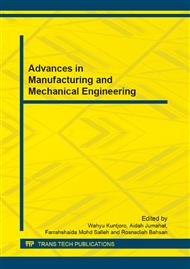p.3
p.9
p.15
p.21
p.29
p.36
p.42
p.51
p.57
Green Lean TQM Suppliers, Organization and Customers Management Practices in Malaysian Automotive Companies
Abstract:
Green Lean Total Quality (GLTQ) Suppliers, Organization and Customers Management System (SOCM) is a system comprises the interrelated linkages between suppliers; organization and customers in Environmental Management System (EMS) practices which are integrated to TQM with Lean Manufacturing (LM) principles. SOCM is essential especially in dealing with inefficient suppliers chain and customers management. The ultimate goal of this system is to focus on achieving total SOCM efficiency that uses EMS and Lean TQM System. A survey questionnaire was developed and distributed to 30 highly active automotive companies in Malaysia and the results analyzed by SPSS. The results suggest that the level of EMS SOCM implementation is low among the 1st tier automotive companies. This shows that LTQM SOCM is more implemented than EMS SOCM among suppliers. Based on the response given, it can be deduced that a high focus and concentration were given to managing suppliers. This is believed due to the LTQM effects on the product quality. It seems that EMS SOCM has no direct impact on the product quality. EMS SOCM mainly caters for the suppliers surrounding rather than that of the customers and final product. The proposed Green LTQM SOCM framework, established in this study based on the results obtained, is believed to offer a preliminary insight on the level of SOCM. Knowing their level, the companies can embark on a new journey to enhance their SOCM. The current proposed framework is a synergy of 4 awards practices and 5 systems. Future study can be conducted to access the status of SOCM in other companies and also extended to other industry.
Info:
Periodical:
Pages:
29-35
DOI:
Citation:
Online since:
September 2013
Price:
Сopyright:
© 2013 Trans Tech Publications Ltd. All Rights Reserved
Share:
Citation:


